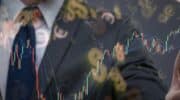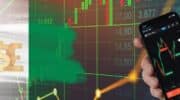- Home
- Forex News
- Reaping big rewards with forex trading: a Kenyan perspective
Reaping big rewards with forex trading: a Kenyan perspective

Although forex is riskier, it is nevertheless worthwhile to attempt. This article will examine some of the hazards and rewards of trading in this intricate financial market as well as examine if investing in FX is safe for Australian rookie traders. We trust that you have enough knowledge from our analysis to decide if forex trading is good for you.
Before starting your forex trading journey, there are a few things to be aware of. These include risk management, which keeps you protected while you take chances with your investment, and knowledge of how the foreign currency markets function. You also need to be familiar with some basic concepts about currency exchange rates and trends. Finally, you need access to helpful tools and resources to track your investments and make informed decisions about where to trade next.
The Importance of Education and Continuous Learning
As a Forex trader, you need to be well-educated to make informed decisions and maximize your profits. Many types of learning opportunities available can help you in this regard.
Benefits of Education for Forex Traders
There are many benefits to obtaining educational qualifications in Forex trading. First and foremost, having a strong background in finance will give you a solid foundation to build your trading strategies. This is key as it lets you understand why certain moves are happening in the market clearly and makes it easier to identify potential opportunities. Additionally, having trouble with math or knowing how to read financial statements? No problem! Many brokers now offer live trading platforms that allow traders to practice their strategy on real-time data. Finally, continuing education is essential for any trader. As the market evolves and new risks emerge, you must stay up-to-date on the latest trends to remain competitive.
Types of Education Available for Forex Trading
Forex traders can pursue three main educational qualifications: academic degrees, certificates and Diplomas/Licenses. Each has its own set of benefits and should be tailored towards meeting the specific needs of the forex trader.
An academic degree in finance, for example, will give you a strong grounding in finance and investment principles. This type of education is ideal for those who want to become professional forex traders. On the other hand, a certificate or diploma in Forex trading will provide you with the basic knowledge and skills necessary to trade forex successfully but may not go into as much depth as an academic degree. Diplomas/Licenses are a third option and can be obtained through colleges and universities that offer courses in forex trading. These courses typically teach traders how to use specific software platforms or strategies.
Which type of education is right for you? The best way to find out is to speak with a financial advisor who can recommend the best course for your needs.
Staying Updated with Market News and Events
In the ever-changing world of Forex, forex brokers must stay up to date on the latest market news and events to reap the biggest rewards. This is especially true in Kenya, where so much can change quickly – both politically and economically – that it can be hard to keep track of everything. However, by staying updated, traders can minimize risk and maximize profits. Here are some tips for staying current with Forex trading:
1. Follow along with industry leaders: Leading industry sources like FXCM offer valuable information and analysis that can help traders stay ahead of the curve. Not only do they provide quality content regularly, but their social media channels are also active forums for exchanging insights with other traders.
2. Keep an open mind: Staying current means experimenting with new strategies and techniques – even if they’re unfamiliar or risky. There’s no harm in taking a little risk now and then to achieve better results over time.
3. Be patient: It’s important not to focus on short-term fluctuations in the market but on building profitable long-term strategies that will consider future trends.
4. Stay disciplined: Many successful forex traders adhere to strict daily withdrawal limits to protect their capital from reckless trades. Likewise, it’s essential to maintain tight stop losses in case of adverse prices.
Maintaining Discipline in Trading
Forex trading is a highly profitable and high-risk investment activity. Many new traders get overwhelmed by the complex forex market and give up before making real money. Discipline is essential for success in forex trading.
Here are some tips on how to maintain discipline:
1) Set realistic goals: Don’t aim to make huge profits overnight – it’s not possible! Be patient and focus on making steady progress over time.
2) Stick to your plan: Don’t be tempted to change plans at the last minute – this will only lead to frustration and losses.
3) Stay focused Throughout the Day: Don’t let your mind wander during trading sessions – it can easily become distracted by thoughts of the past or future, leading to mistakes. Keep your eyes glued to the charts and monitor the market conditions closely!
4) Remember that losses are part of Forex Trading: It’s important not to get too attached to any one trade or position, as even great traders have lost money from time to time. Just keep learning from your mistakes and stay disciplined – you’ll soon start seeing big rewards in forex trading!
Seeking Professional Help
Forex trading is a highly complex and risky business that can often lead to large losses. If you struggle to make consistent profits, it may be worth seeking professional help. Several different types of professional help are available for forex traders, each with its benefits.
Here’s an overview of what you can expect from each type of professional help:
1. Technical Analysis: A skilled technical best forex broker in Kenya can identify patterns in the market that suggest which currencies are about to gain or lose value. This information can help you make profitable trades early on in the market before the prices have had time to move too far.
2. Fundamental Analysis: Fundamental analysts use a variety of data sources to determine whether a currency is overvalued or undervalued based on factors like supply and demand. This information can help you make informed investment decisions rather than just gambling on the markets.
3. Behavioral Finance: Behavioral finance experts focus on how investors make financial decisions – usually based on emotions rather than logic. Understanding how people behave in the markets can improve your odds of making profitable trades.
4. Financial Planning: A financial planner can help you manage your long-term and short-term finances, ensuring that you always make optimal investments based on your goals and risk tolerance. They’ll also provide advice on stability and risk management strategies for forex trading in the future.
Conclusion
Forex trading is a very successful kind of investing that provides both outstanding short- and long-term rewards. The following are some of the main ideas covered in this blog post:
1. Forex trading offers potential to make significant returns in any market circumstance because it is a worldwide market.
2. To assist traders in achieving their objectives, forex brokers provide distinctive features and services.
3. To success in this field of investment, it’s critical to have a solid plan in place and adhere to the suggested forex trading techniques.
4. It’s also crucial to have patience and never give up because success in forex trading requires both of these qualities. Anyone can become a profitable forex trader with effort and determination!





